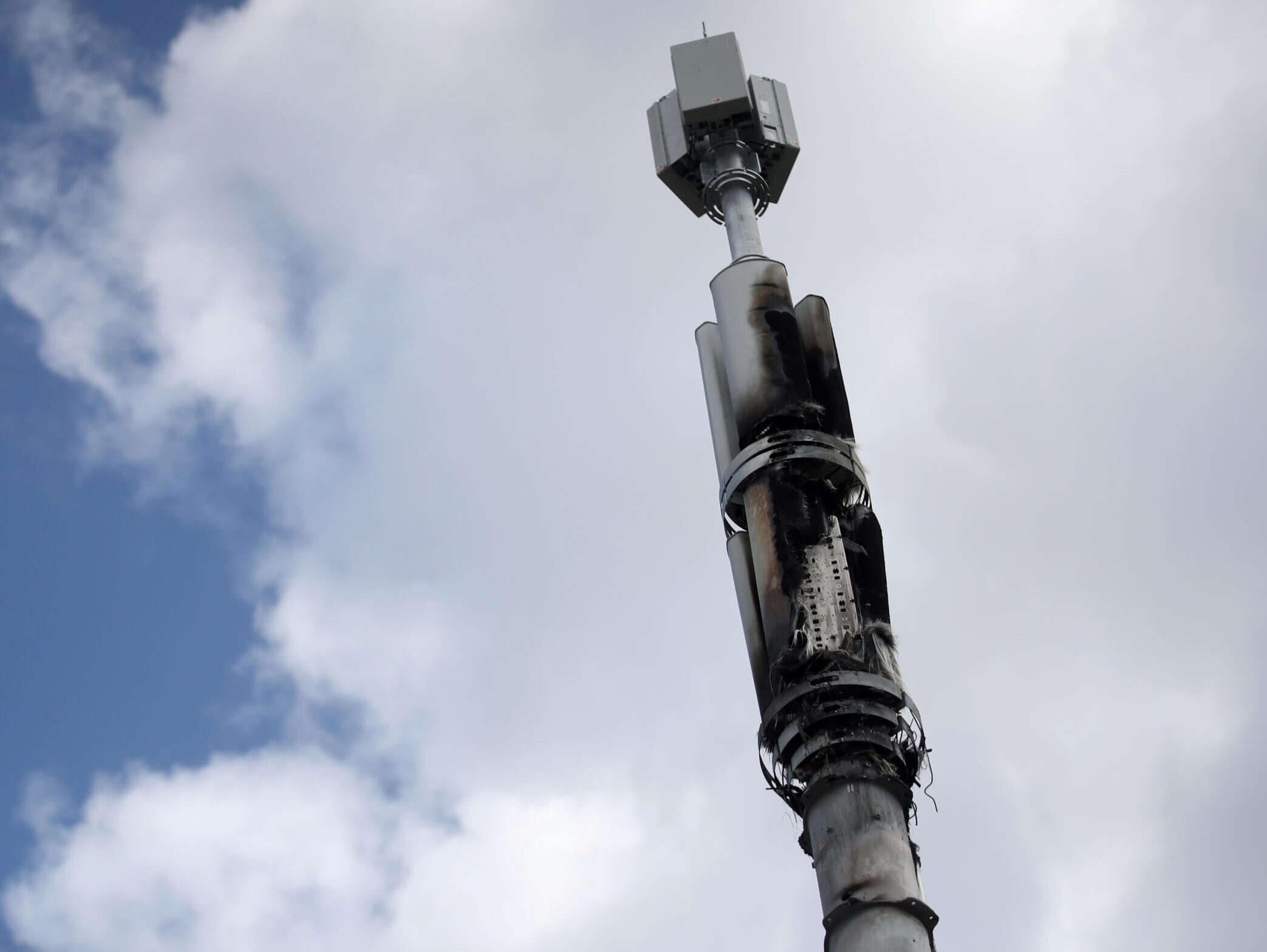
The Government has called for social media companies to do more to clamp down on “crackpot theories” that have seen 5G phone masts set alight and telecoms workers attacked over the past week.
False claims have circulated online that 5G technology has helped transmit coronavirus (Covid-19), apparently resulting in attacks on at least 20 mobile phone masts (pictured) in the UK in the past five days.
Many journalists, including at fact-checking charity Full Fact and the BBC’s Reality Check team, have worked to debunk the idea.
The Department of Digital, Culture, Media and Sport tweeted on Friday that there is “absolutely no credible evidence of a link between 5G and coronavirus”.
It added yesterday: “We must also see social media companies acting responsibly and taking much swifter action to stop nonsense spreading on their platforms which encourages such acts.”
DCMS Committee chairman Julian Knight repeated the call for more action today, saying: “To hear that crackpot theories are leading to people attacking phone masts or threatening telecom workers is sickening and it’s clearly time to act.
“We’ve called on the Government to work with social media companies to stamp out deliberate attempts to spread fear about Covid-19 and it is right that they are being called to account for allowing disinformation on their platforms.”
A Facebook spokesperson told Press Gazette the company is removing false claims linking Covid-19 and 5G that “could lead to physical harm” under its existing policies against harmful misinformation, introduced in 2018.
Facebook decides what posts could lead to “physical harm” based on guidance from health authorities and governments. These include false claims that could increase the likelihood of someone getting, or spreading, the virus or that could lead to violence.
Other coronavirus-related posts removed under the policy since January have included those making false claims about cures, treatments, the availability of essential services or the location and severity of the outbreak.
The platform is also removing posts encouraging attacks on cellular towers or 5G masts.
Facebook and Twitter respond
The Facebook spokesperson said: “We are taking aggressive steps to stop misinformation and harmful content from spreading on our platforms and connect people to accurate information about coronavirus…
“We will continue to work closely with governments and other tech companies to remove harmful misinformation and have partnered with health authorities like the World Health Organisation and NHS to connect people to the latest official guidance.”
Twitter announced last week it had removed more than 1,100 tweets containing “misleading and potentially harmful content”.
A spokesperson said today: “We’re focused on protecting the public conversation and helping people find authoritative sources of information on Twitter.
“We will continue to take action on accounts that violate our rules, including content in relation to unverifiable claims which incite social unrest, widespread panic or large-scale disorder.
“If people see anything suspicious on our service, please report it to us. This is an evolving global conversation and we will remain vigilant.”
State-backed news outfits ‘disseminating disinformation’
Knight also wrote to Ofcom’s new chief executive Dame Melanie Dawes today urging the broadcast regulator to “investigate whether international news organisations are using social media to disseminate state-backed disinformation on Covid-19 in order to get around UK broadcasting regulation”.
He pointed to recent reports suggesting Chinese state-backed news organisations including the English language China Global Television Network had contributed to “disseminating false narratives”.
He also shared concerns that Iran’s Press TV, which lost its UK TV licence in 2012, was still able to spread conspiracy theories through social media.
Knight therefore asked Ofcom what it was doing to monitor and regulate particular broadcast media organisations on this issue and whether sanctions may be considered for any offenders due to the nature of the crisis.
“Successfully tackling Covid-19 requires scientifically-robust health information to be trusted, and this requires clear, concise public messaging that is accessible to all,” he wrote.
“False narratives crowd out trusted sources and, as a consequence, increase the risk to us all.”
An Ofcom spokesperson confirmed the regulator has received Knight’s letter and said they would be responding shortly.
Picture: Reuters/Carl Recine
Email pged@pressgazette.co.uk to point out mistakes, provide story tips or send in a letter for publication on our "Letters Page" blog
